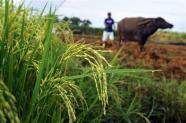
An international fact-finding team is in the country to investigate the alleged land-grabbing by Philippine, Japanese and Taiwanese companies of some 11,000 hectares from indigenous peoples in Isabela to build the biggest bio-ethanol project in the Philippines.
The international mission is composed of delegates from the Organic Consumers Association (USA), Global Forest Coalition (Paraguay), Action Center for Development and Rights (Japan), Friends of Earth (Japan), Philippine Solidarity Network (Canada); and from the Philippines, the Asian Peasant Coalition, Southeast Asia Regional Initiatives for Community (Searice), Advocates of Science and Technology for the People (Agham-Philippines), Sentro Para sa Tunay na Repormang Agraryo and the peasant group Kilusang Magbubukid ng Pilipinas (KMP).
Danilo Ramos, KMP secretary general, said the land covered the three towns of San Mariano, Ilagan and Benito Soliven and were devoted to rice and corn.
“In the 2,200 hectares converted into a nursery in the eight barangays (villages) of San Mariano alone, more than 1,000 farmers and indigenous people are now in the teeth of displacement,” Ramos said in a statement to the House of Representatives.
Ramos said foreclosures and cancellations of certificates of land ownership awards distributed under the government’s Comprehensive Agrarian Reform Program Extension with Reforms (Carper) were taking place in San Mariano.
“This concretely shows the failure of the bogus Carper to defend farmers’ rights to the land,” Ramos said. “The sham Carper itself allowed multinational corporations to control vast tracts of lands.”
At the forefront of the bio-ethanol project is Green Future Innovations Inc. which plans to put up a 54–million liter ethanol plant in San Mariano that will cost $120 million dollars.
The bio-ethanol production plant will use sugarcane as feedstock that will be sourced from a nearby 11,000-ha sugar plantation.
Green Future Innovations is a venture between Japanese companies Itochu Corp. and JGC Corp. Joining them are Philippine Bioethanol and Energy Investments Corp. and GCO, a holding company from Taiwan.
Online reports said that the capital infusion for the bio-ethanol plant was one of the pieces of “good news” that President Aquino brought home from his visit to Japan last year.
“Under the guise of so–called alternative energy, widespread land–grabbing and the massive displacement of farmers from their farmlands is now taking place in Isabela courtesy of the landlord President,” Ramos said.
Composing the fact-finding team are Jill Richardson of Organic Consumers Association, Simone Lovera of Global Forest Coalition, Yasuo Aonishi of Action Center for Development and Rights, Tanya Roberts of Philippine Solidarity Network, Hozue Hatae of Friends of the Earth, Feny Cosico of Agham, Edna Maguigad of Searice, Cesar Arellano of Sentra, Danilo Ramos and Wilfredo Marbella of KMP, and Rhoda Gueta of APC












